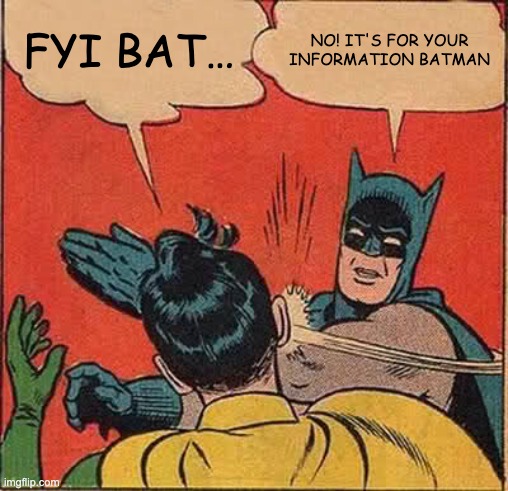I definitely hate acronyms and abbreviations

This is a simple prayer, I'm sorry If you're not a believer.
Dear internet gods, could you please give bloody diarrhoea to every person using acronyms without consent and most importantly without giving a lexicon for the fuck sake!
Thanks
After this little prayer, let me explain why.
1) Acronyms create barriers.
Acronyms might sound like secret codes, making it tough for folks who aren't in the know. They create an "us versus them" situation where insiders use these secret language shortcuts sometimes too much, leaving the rest of us feeling miserable like we're on the outside looking in.
2) Acronyms create confusion.
Imagine you're having a conversation with someone, and they mention "CTA." You assume it means "Call To Action," but to your surprise, they're talking about something entirely different, like "Cutest Tiny Animals."
Then you realize that you're not in your Monday board meeting but in the (well-known) Tiny Animals convention. And you are on stage wearing a tortoise costume.
Using Acronyms, it's speaking a different language, causing a disconnect in understanding.
Regarding different languages, using these secret fucks can cause even more brain damage in a multilingual environment.
For instance, when discussing terms like GDPR (General Data Protection Regulation)/RGPD (same thing but in French) and EU (European Union)/UE (same thing but in French), it's common for individuals to inadvertently use the acronyms from their native language, creating a cognitive challenge for the person listening. This linguistic mix-up can often lead to confusion, as the listener may need to mentally switch between different language acronyms, adding an extra layer of complexity to the conversation.
3) Acronyms generate cognition overload.
Think about all the acronyms you encounter every day, each with its unique meaning. Memorizing and mentally translating these acronyms can be a challenging task. It's like having to constantly remember and decipher many secret codes just to follow a conversation. This can be a mental workout for some people who didn't sign up for it.
As a dyslexic person, it's even more complicated, making conversations unnecessarily challenging for me.
As an illustration, let me give you an extract from a book that I am reading.
From The Clean Architecture by Robert C. Martin.
"An architect who focuses on just the REP and CRP will find that too many components are impacted when simple changes are made. In contrast, an architect who focuses too strongly on the CCP and REP will cause too many unneeded releases to be generated."
Now imagine reading that book, discovering the meaning hidden behind "REP", "CRP" and "CCP", trying to keep all that in mind and continuing your reading. It's fucking hard and I'm pretty sure that even if you have a great memorization you will have to seek for the definition once or two. In two or three days without reviewing the terms, you'll probably never remember it either.
What a waste of your time!
4) Acronyms make you speak like a robot.
Using acronyms without providing a definition for those not in the loop can turn conversations into monotonous, without sens robotic exchanges. It's like talking to a computer program rather than a fellow human being. Where's the warmth and personality in that?
5) Using those addition od capital letters is extremely lazy.
Writing or saying "CTA" instead of "Call To Action" is indeed a lazy practice. Laziness at work typically revolves around the idea of saving time; however, the issue with this particular shortcut is that it doesn't save any time when your message is not clearly understood.
In terms of speaking, using "CVR" (Conversion Rate) is almost as quick as saying "CVR" instead of "Conversion Rate."
6) No rules for these little fancy codes.
I'm asking, how do we find the meaning of something created without any rules?
Example:
CTA: Call To Action. All the first letters are capitalized, simple.
CVR: Conversion Rate. Oh! Now the first two syllables for long words, that's okay.
CSAT: Customer Satisfaction. This world has no rules.
E.G: "Exempli Gratia" means "for example" in Latin! What?! I'm done with this.
Conclusion
So, there you have it – acronyms might be handy for some, but they can also create unnecessary barriers, confusion, and cognitive overload for others. Also, people won't necessarily ask for the definition in a professional environment. Who wants to be the one asking what everyone around the table seems to understand by nodding like a real pro.
Example scenario ⤵️
Chlamydia: "We can see in these inverted charts with tiny cats to be more inclusive, the PTDR (Profit-To-Donut Ratio) predicts that the CBGTBS (Customer Base Growth Through Bootstrapped Scaling) is very low."
Estron (nodding): "Yeah, Chlamy, very low indeed"
Cheerz, SYIMNP (see you in my next post.)
Thanks for reading this, love you all.
If you want to discuss this article, feel free to reach out to me (the link opens a new tab). I'd be happy to hear from you.
💩